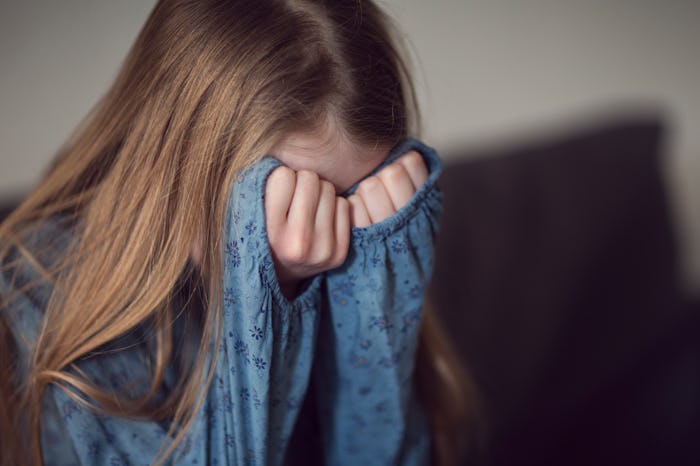Mental Health

Signs Of Anxiety In Kids & Teens, According to Experts
It can start as early as preschool for some kids.
Over the last decade or so, talking openly about mental health and treatment has become more normalized. Because of this, parents today are on the lookout for signs of anxiety in kids so they can quickly help their children get the treatment they need. In order to be successful in this, though, parents need to know what to look for in their child.
How anxiety presents in adults is significantly different than how it looks in young children, which is also different from the signs of anxiety in teens or tweens. This means that even parents with the best of intentions can easily overlook their child’s symptoms and brush them off as minor behavior or social issues.
So, if you’re noticing changes in your child’s behavior, here are some of the different signs of anxiety in children, based on their age.
Signs Of Anxiety In Preschool Children
Parents of preschool-age kids are probably used to seeing their kids exhibit strong emotional responses to just about everything because that’s a normal part of development. Unfortunately, that’s also what makes it so difficult for parents to notice when something larger is going on with their child. Though it can sometimes be subtle, a common indicator for anxiety in preschoolers is exhibiting regressive behaviors, licensed mental health counselor and registered play therapist-supervisor, Andrea Vargas, LMHC, RPT-S, tells Romper. Some examples she gives include:
- Sudden clinginess
- Crying easily
- Irritability.
In an email to Romper, clinical psychologist Venus Mahmoodi, PhD, agrees and notes that parents may see their child throwing tantrums even though they’re developmentally beyond that stage. What is difficult, though, is that preschoolers can regress for a variety of reasons, so you’ll want to be on the lookout for more than just that. Additional possible signs of anxiety in preschoolers are:
- Complaints of headaches
- Stomach issues
- Nail-biting
- Hair plucking/twirling
If your child is only exhibiting signs of regression, Dr. Mahmoodi advises parents not to just assume they’re being defiant, but to instead investigate a little. “Many times parents see these behaviors as defiance or willfulness, but once parents dig a little deeper and ask what's going on, kids are able to express their anxieties,” she says.
Anxiety In Elementary School Children
Younger elementary-aged kids may show similar signs as preschool-age children, however, as they continue to develop from kindergarten through fifth grade, the signs start to stand out a little more. Vargas notes the following common signs:
- Difficulty focusing
- Fidgeting
- Clinginess
- Difficulty sleeping
- Increased fears
- Changes in eating habits
- Crying easily
- Irritability
- Panic/Anxiety episodes
- Complaints of stomach issues
“Going to sleep alone or staying asleep” are often signs of anxiety in elementary school children, Vargas notes, and she says kids who are experiencing a panic or anxiety episode may look like they are hyperventilating and/or sweating heavily.
Anxiety In Middle School Children
The middle school, or tween, years are when kids start really feeling self-conscious, regardless of whether or not they have a mental health condition. They’re often moody and closed-off by nature so, once again, signs of anxiety can be easy to brush off. However, Vargas emphasizes the importance of parents’ vigilance and points out the World Health Organization’s (WHO) statistic that “half of all mental health conditions start by 14 years of age but most cases are undetected and untreated.”
Some signs of anxiety in middle school kids, according to the peer-reviewed journal, Adolescent Health, Medicine and Therapeutics include:
- Restlessness
- Muscle tension
- Difficulty sleeping and/or fatigue
- Irritability
- Difficulty concentrating
- Panic episodes; racing heart, sweating, trembling, tight chest, shortness of breath
Anxiety In High School Children
By the time kids reach high school, their symptoms may start presenting a little more similarly to adults. However, many of them are easy to pass off as something circumstantial like poor teaching or a rift with friends at school. Vargas explains high schoolers dealing with anxiety may exhibit:
- Difficulties focusing
- Difficulties sleeping; either falling or staying asleep
- Change in eating habits; overeating or not eating as much
- Drop in grades
- Crying
- Irritable mood
- Panic or anxiety attacks
What To Do
Again, the difficult part of anxiety is that many of the signs are also symptoms of other common conditions or situations, so Vargas advises parents/caregivers “rule out any medical reasons [or] medication side effects” that could be causing these behaviors. Once that has been ruled out, Dr. Mahmoodi suggests parents teach their children “to take deep diaphragmatic breaths” to help them re-center when their anxiety gets to be too much. Also, figuring out what is triggering your child is important, notes Vargas. “Spend time talking [or] playing with your child, be supportive, [and] try to figure out triggers” such as life changes, family, or changes in school, Vargas says
Additionally, Dr. Mahmoodi recommends parents, especially those of young children, know how to manage their own emotions in order to help their children. “I recommend parents use coping strategies for themselves to manage their emotions before engaging an anxious child. Calm your body with deep breaths and remind yourself that the child cannot express themselves as effectively as an adult,” she says.
Finally, understand that you may not be the best person for this job and that you may need to call in a professional. “Asking for help makes you a good parent,” says Vargas, “Have your child speak to someone if you have concerns, we need to normalize asking for help when we are struggling.”
Experts:
Venus Mahmoodi, PhD, Adjunct Faculty and Affiliate Scholar, Teachers College, Columbia University and Clinical Psychologist, Khalil Center
Andrea Vargas, LMHC, RPT-S, Licensed Mental Health Counselor and Registered Play Therapist-Supervisor
This article was originally published on